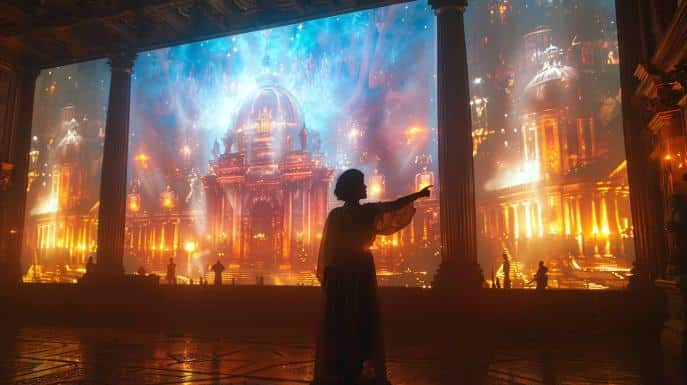Have you ever imagined what it would be like to navigate the tumultuous tides of world history, uncovering the important historical discoveries that shaped our present?
Em “Viagem pela História Mundial: extrair lições”, convidamos você a uma exploração profunda, onde cada inovação, cada confronto e cada cultura transcendem o tempo para oferecer insights preciosos. Quais foram os marcos da Revolução Industrial? Como os grandes exploradores alteraram nossa visão de mundo? E que sabedoria podemos colher das revoluções que testemunharam o nascer de nações? Junte-se a nós nesta jornada transformadora para entender como as lições do passado podem iluminar os caminhos do futuro.
What lessons can we learn from important historical discoveries?
The innovations of the Industrial Revolution, which marked an era of significant technological progress, included the mechanization of textile production and the development of the steam engine. These discoveries not only boosted productivity, but also sparked serious debates about worker exploitation and environmental degradation.
Maritime exploration laid the foundation for globalization, with great geographic discoveries expanding trade, spreading cultures and, unfortunately, instigating colonialism and conflict. The consequences of wars, on the other hand, have shaped international relations by emphasizing the importance of diplomacy and the promotion of peace, given the profound impact on loss of life and geopolitical reconfiguration.
Each of these important historical discoveries, whether in the realm of technical progress, cultural interconnection, or complex post-war political arrangements, offers us invaluable lessons about adaptation, sustainability, and the nuances of human coexistence.
How did influential personalities in history contribute to the development of civilizations?
Influential personalities such as Churchill and Gandhi left leadership lessons that shaped societies. Churchill, with his resilience in times of war, and Gandhi, through peaceful resistance and non-violence, demonstrated that integrity and vision are fundamental.
The impact of ancient civilizations and their legacies remains alive, as in modern political systems and infrastructures. These lessons from world history resonate today, encouraging innovation and the building of a more peaceful and inclusive global community.
What can we learn from historical revolutions and independence movements?
How did independence movements influence the formation of contemporary democracies? Contemporary democracies have been shaped by the ideals of freedom, equality and self-determination, principles often coined and disseminated during independence movements.
How did revolutions drive political reforms and the evolution of societies? Historical revolutions were catalysts for profound political reforms, replacing absolute monarchies with more democratic governmental systems and stimulating the evolution of societies towards more just and equitable social structures.
How have art, culture and science developed over time and what is their impact today?
Art and architecture play vital roles in documenting and celebrating human history, capturing the emotions and ideals of an era, as well as serving as lasting symbols of the societies that created them. These aspects were essential to a cultural renaissance, which often follows technological advances in history.
As for cultural traditions, they have the ability to persist and at the same time transform, allowing one generation to pass on their beliefs and practices to the next, while adapting to new contexts and influences. The current impact of art, culture and science is immense, influencing not only our aesthetics and values, but also how we live and interact with each other.
By revisiting the discoveries that defined the trajectory of humanity, from industrial innovations to maritime explorations and the consequences of war, we glimpse the intrinsic tapestry of our collective past. The personalities who shaped civilizations and the movements that shook social structures teach us about the complexities of leadership, and the revolutions that led to democratic and social reforms. Furthermore, the evolution of art, culture, and science illuminates our present, showing the continuing influence of each era. Each facet of the past contributes to a richer understanding of our world today, encouraging us to shape a future filled with innovation, empathy, and cultural resilience.
FAQ
1. What lessons does the Industrial Revolution teach us about the relationship between technical progress and social impacts?
The innovations of the Industrial Revolution, such as the mechanization of textile production and the steam engine, teach us that technical progress can boost economic productivity. However, they also serve as a warning about potential negative consequences, such as worker exploitation and environmental degradation, illustrating the importance of considering social impacts when pursuing technological advances.
2. How have discoveries from maritime exploration influenced the modern world?
Discoveries from maritime exploration were fundamental to the basis of globalization, expanding trade and spreading cultures, allowing us to understand the complexity of our interconnected world. However, they were also responsible for instigating practices of colonialism and conflicts, which reminds us of the importance of learning from the past when building international relations based on diplomacy and promoting peace.
3. How did historical figures like Churchill and Gandhi shape the development of civilizations?
Personalities such as Churchill and Gandhi exerted a significant influence on the shaping of modern societies, highlighting the importance of leadership in driving social and political changes. Churchill exemplified resilience during times of war, while Gandhi propagated non-violence, both leaving a legacy of integrity and vision that encourages us to prioritize these values in the continued development of civilizations.
4. How have historical revolutions contributed to contemporary democracies?
Historical revolutions and independence movements have contributed immensely to contemporary democracies by promoting ideals of freedom, equality and self-determination. His legacy teaches us that the desire for reform and social evolution can lead to the establishment of government systems that value these principles, profoundly transforming societies towards a more just and equitable structure.
5. What is the role of art, culture and science in human development throughout history?
Art, culture and science have played crucial roles throughout history, not only in recording and celebrating human advancements but also as catalysts for cultural renaissances that follow technological innovations. These elements are fundamental in influencing our aesthetics, values and the way we live and interact, illustrating how cultural traditions adapt and persist through time, shaping contemporary society.

